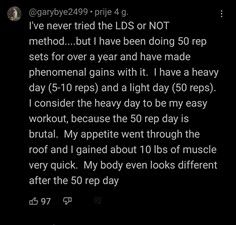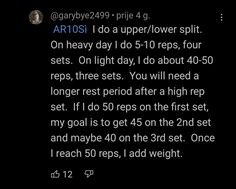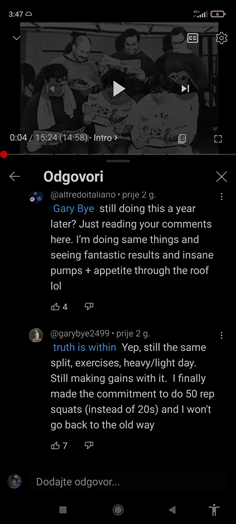-
@xyit idealabs
-
@sphenoid Yes, I’ve been there before. Miserable state, that can go on for a long time unrealized when you bank on willpower/stress hormones. Hope to save many from this fate!
-
-
 B brad moved this topic from Bioenergetics Discussion on
B brad moved this topic from Bioenergetics Discussion on
-
What do you guys think about training in the higher rep ranges (50-100 reps), with ligher weights; in the style of Eugene Sandow's Light Dumbell System or Nucleus Overload?
Personally, when I started training higher reps with resistance bands, I couldn't go back to the old way. Was inspired by this channel to try resistance bands:
Youtube VideoAlso, I recommend anyone to try the chest expander: a great workout for the traps and shoulders.
-
@nikola I won't lie to you, you must be out of your mind to be doing 50-100 reps
-
@Hitler hahah, maybe 100 reps was a bit of an exaggeration. But only 1 rep, 50 reps with light weight, 2 times a week.
-
@nikola
I did a modified Sandow's after I saw GEBookworm's video. The first section is good for developing mind-muscle control, getting a pump if you'd like, working muscles for the first time, or taking it easy from an injury(as I was with wrist issues). There's a reason why it's followed up by progressive weight training- the low-CNS stimulus high-rep familiarizes various movement patterns and builds the foundation for the "growth" portion which comes from the progressive lifting.
I wasn't meticulous with my measurements, mostly just trying to move, but I did find it easier than many other workout programs because almost no one ever uses weights below 10lbs, so there's always some available.
-
@xyit tongkat made my test go from about 850 to 1100ng (which could just be a normal fluctuation) but honestly I don’t recommend the stuff at all as it also made my prolactin go from 11 to 19. Androsterone (tries with the usual preg/dhea combinations) is far more effective with what I think is a semi-similar effect (AI via DHT) but like all herbs TA does so through a far more complex and messy mechanism. Cistanche is a bit better and felt like it had other benefits (sleep and digestion) but has the same tolerance effects you would see from any herbal med.
-
@JulofEnoch oh, I see, it teaches you how to use certain muscles and correct technique.
What about combining high rep, and low rep progressive weight traning? For example, on monday high rep, friday low rep.I saw a comment on a video by GEbookwork talking about this type of workout:



-
@nikola
To be honest, I'm not too familiar with any research or discussions about mixing high-rep and low-rep days. I guess my question would be: what is the desired outcome of such a split?
If it's hypertrophy, I don't see any reason why you wouldn't be consistent in moderate-to-high reps through the week.
If strength training, I don't see why you wouldn't be consistent in low-to-moderate reps through the week.
The best reasons I could think for splitting:
a) you have time constraints and one of your workouts is pragmatically shorter than the other
b) you're using the high-rep day as a moment to boost your average exertion over the week(adding general low-level physical load)
c) most important: that type of split gives you consistency and its easy for you to do continually.The best routine is the one that you can continue doing- results vary from changes in that routine, but you'll never achieve good or great results with inconsistency.
I'm not sure how familiar you are with weightlifting, but don't get too caught up in what other people say their routines are and their results; you have no idea what that random YouTube commentor is doing in their life.
Pick a routine and see it through to the end.
-
Thank you for your advice.
I am not really familiar with following any weightlifting routines or training;
I would always do exercises that felt the best for me in that period of life, mentally and physically.Based on my character and needs, hypertrophy with elastic bands would be the most appropriate; exercise is more of a meditation for me; and the most important part as you say: I would be consistent in my training.
-
@The-Good-Doctor I’m interested in cutting, but would you recommend strengthening metabolism through a bulk first?
-
@Τιμόθεος Yes. You should seek to up your metabolism and put on muscle mass and raise your baseline metabolic rate until fat loss becomes a secondhand effect, you shouldn’t have a mindset of “cutting”.
I would argue our food supply is so bankrupt of nutrients and that we vastly underestimate the caloric needs of muscle tissue, that “bulking” may be the only way to cut, assuming plentiful exercise and sleep.